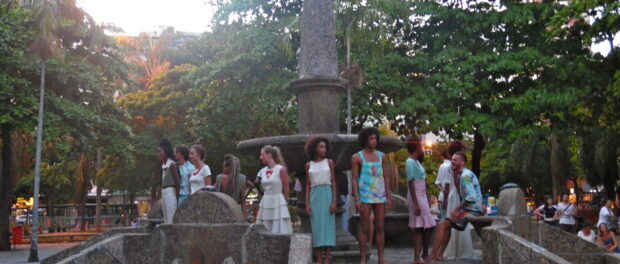
On Thursday March 5 a collection of clothes designed by fashion students of Casa Geração school in Vidigal was showcased in the empty fountain of General Osório Plaza in Ipanema, instead of at the much anticipated Fashion Rio show. Fashion students, members of Rio de Janeiro’s fashion community, and bystanders were present to watch the show.
The event, Só Sobrou a Rua (Only the Street is Left), was organized by Casa Geração as a protest against the second postponement of Fashion Rio’s exhibition where the students’ work was supposed to be showcased. Fashion Rio was postponed because the event is still under review by the Fashion Business Forum of the Industries of the State of Rio de Janeiro. In an interview with O Globo, Paulo Borges, responsible for the operations of Fashion Rio, explained that the forum is faced with the challenges of reforming the event and evaluating the strategy of the fashion market in Rio.
Casa Geração was created with the objective of providing students from Rio’s favela communities with the tools and outlets to express their creative potential. Below are interviews with students of Casa Geração who express their hopes for the future of fashion in Rio as well as their frustrations with the lack of opportunities to showcase their hard work.
Jessica Serna, 19 years old (left)
How do you see the relationship between fashion and protest?
Look, I think that fashion has everything to do with protest because we dress and we have our attitude. Even moreso now that Fashion Rio was closed or postponed. We need Fashion Rio to support the fashion market in its development. And I think the people from the last course need to present their work, to show what they did this whole year. This is what is behind the protest, protesting against this, against Fashion Rio closing for now and only happening in April, you know? They keep postponing, postponing.
How do you think Rio should present itself in the fashion world?
I think we have to show more of our lifestyle, our happiness. Unfortunately we don’t create so much fashion that is really unique, we don’t copy but we make things similar to things from outside [of Brazil]. I think we need to show more of what we have here.
Carmilies de Lisia, 23 years old
How do you see the relationship between fashion and protest?
I think [fashion protest] is a way for us to call attention, you know? And for us to be a part of the show because we were kind of abandoned, you know?
What are your hopes for the future of fashion in Rio?
Look, I think nowadays it is growing even more. Everyone is training, doing their part and in this way it will continue to grow even more.
Alan, 22, Mariani, 20, and David
How did you get interested in fashion?
Mariani: Wow, it’s difficult not to get interested in fashion. Fashion is in everything.
Alan: Fashion attracts, and you go crazy, you get lost in the world, you give yourself.
How do you see the relationship between fashion and protest?
Mariani: Right now we see it very clearly related to how today Fashion Rio was postponed. This is what brought protest and fashion together. Looking forward it is possible [this relationship] grows even stronger.
Alan: Because fashion never stops, fashion cannot stop, ever.
How do you think Rio should present itself in the fashion world?
David: As the first world, of course! Because here in Rio we have really talented people, people from Rio are very talented, they are hard-working and have the force of desire. So I think it should present itself as the first world like Paris and Milan.
Mariani: Our struggle is the only one like it, here you find everything from the most stylish to the most tacky. Rio has everything to really be first world, part of the fashion of the first world.
What are your hopes for the future of fashion in Rio?
Mariani: A lot of jobs.
David: My hope is that Rio is known. When you talk about Brazil, you talk about Rio. Don’t talk about Brazil and talk about São Paulo, you have to talk about Rio as Brazil and the fashion in Rio. Made in Rio.



